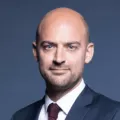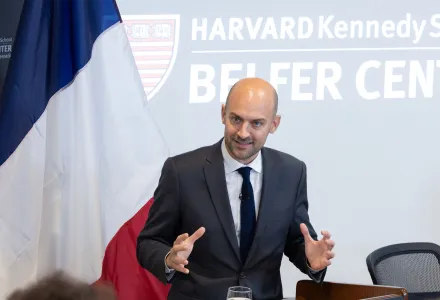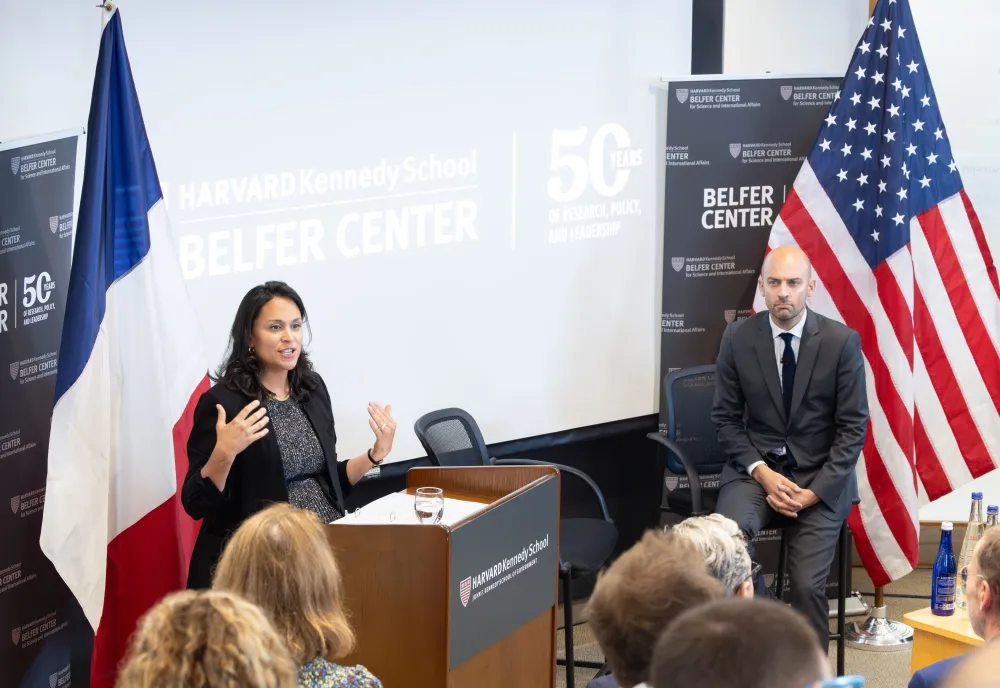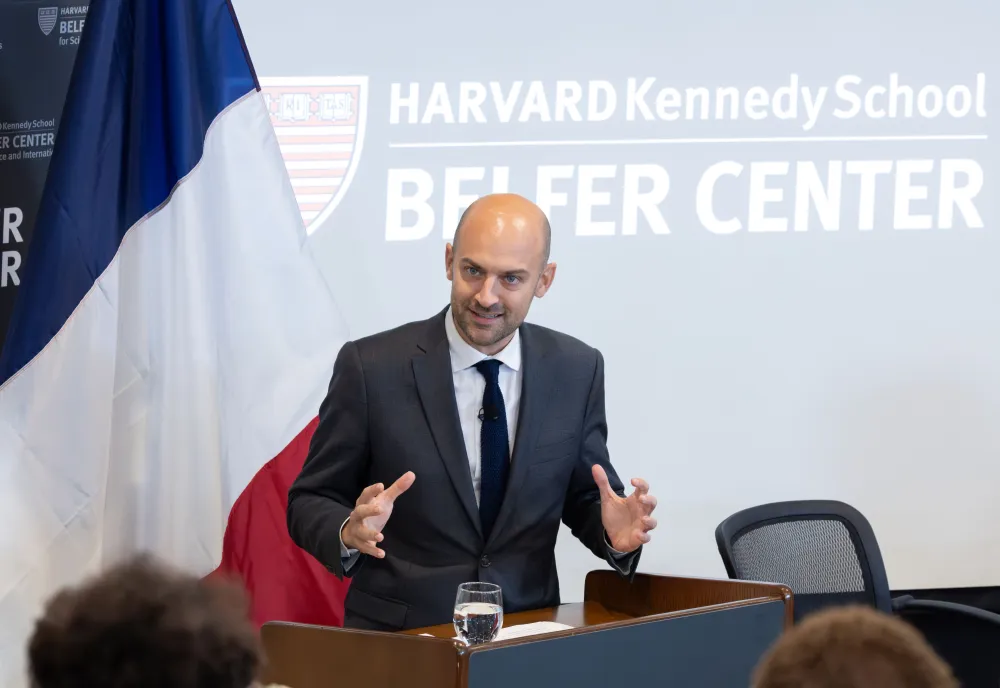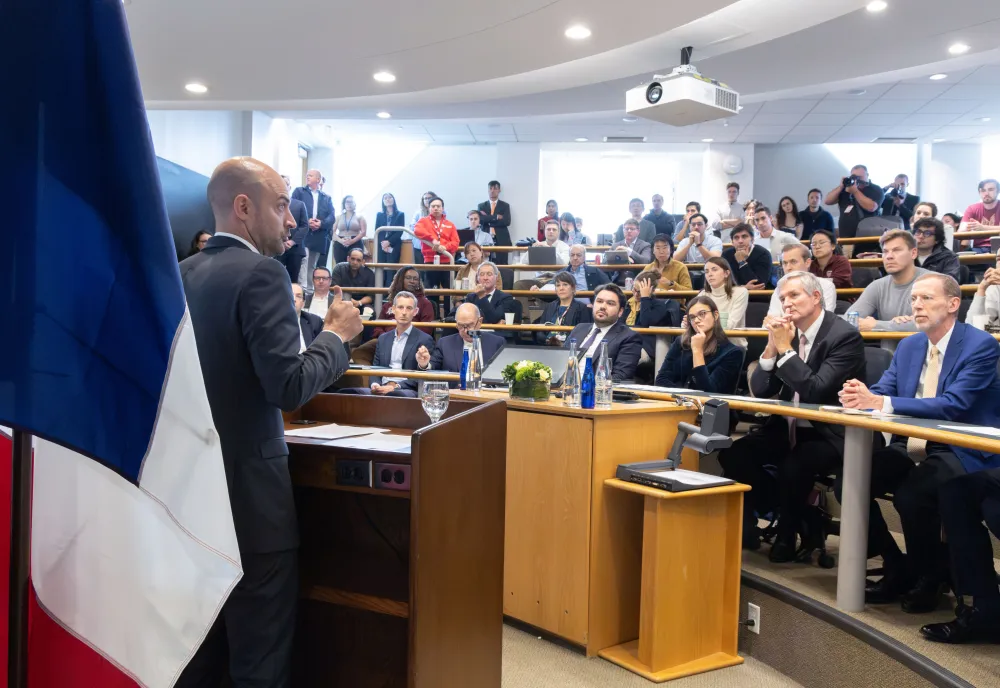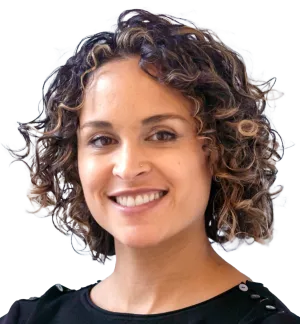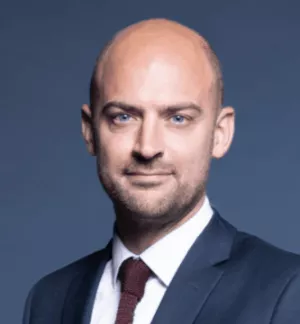Speakers: Natalie Colbert (Colbert) and Minister Jean-Noel Barrot (Barrot)
_______________________
Colbert
…Minister Barrot held roles at the cabinet level and also in the French National Assembly. He has closer to home, also served on the faculty at MIT in a previous life. So in that regard, we're also very thrilled to welcome you back to this intellectual community. Our session today, as you all know, comes in the midst of the UN General Assembly's high-level week in New York, where leaders are here discussing a myriad issues that are facing the global collective, particularly with the UN marking its 80th anniversary. This moment in particular spotlights both the present and the future of our multilateral institutions, as well as the ongoing shifts in the global order.
And in addition to what's happening on the international stage, as many of you will follow in France, as they lean towards coalition building around issues such as Israel and Palestine or the war in Ukraine, domestically, they're also in transition with the new prime minister and a looming budget crisis. So with all of these themes in the mix, today we're going to explore issues of democratic resilience, the future of multilateralism, and several other themes with our discussion. I'll now turn it over to the minister to give some opening remarks, and then after that we'll be in a brief conversation before I open it up to questions from the audience. So thank you, Mr. Minister.
Barrot
Thank you very much for your kind words. And indeed it is good to be back to Cambridge where I left a number of memories, colleagues, and friends. I grew up in Central France on the land ringed by old mountains and dormant volcanoes. I grew up with a legend of a hero, a hero who was also born and raised on this land, a hero of the two worlds, as we call him, for France and for the United States of America. So let me tell you his story as an introduction. He was raised by his mother and aunt on this land. And when he turned 19, he heard of bold men fighting for freedom and democracy on the other side of the Atlantic. He defied his boss at the time. He boarded a ship in Bordeaux and he landed in North Island near Georgetown, South Carolina. He stood shoulder-to-shoulder with the American Patriots.
He fought amongst them. He became friends with George Washington. He bonded with Thomas Jefferson, who was at the time writing the Declaration of Independence. Remember those words. "We hold these truths to be self-evident that all men are created equal, that they're endowed by their creator with certain inalienable rights, that among these are life, liberty, and the pursuit of happiness." Our young men took these powerful words back to France. And few years later, just three days before the storming of the Bastille, he wrote the first draft of the Declaration of the Rights of Man and of the Citizen that said, "Men are born and remain free and equal in rights. The aim of every political association is the preservation of the natural and imprescriptible rights of man. These rights are liberty, property, safety, and resistance to oppression." Clearly you hear the influence of Thomas Jefferson.
And this is the story, by now you have guessed it, of Lafayette. This was 250 years ago. In fact, today, September 25th, we celebrate the 249th anniversary of Congress' decision to mandate Benjamin Franklin to negotiate a treaty with France to consolidate American independence. So the powerful words of Jefferson and Lafayette have survived the test of time, so much so that a century and a half later, the same story happened, but the other way around. On the full moon night of June 6th, 1944, thousands of young American men boarded ships heading to the shores of Normandy, where many of them would spill their blood to liberate France, my country, from oppression for the very same reason why young Lafayette had crossed the Atlantic in the first place. So think for a minute, ask yourself, why did this young man cross the Atlantic and risk everything they got? Why did they do it? What does it take?
It takes a simple idea, an idea that France and the United States have championed for over two centuries, an idea that has brought so much to the world and that holds in one single word, democracy. Democracy has the vision of a society in which enlightened citizens decide for themselves. Democracy has a fragile but incredibly powerful institutional framework resting on three pillars. First pillar, fundamental rights. Some rights are sacred, you cannot touch them. Second pillar, one man, one vote. Law is made by the people, for the people. Third pillar, the rule of law. Everyone has equal rights, no one is above the law. If all three principles hold, democracy will hold. Should one be shaken, then democracy will falter. But when democracy holds, it is indeed the most conducive institutional framework for prosperity, welfare, and peace. This is not an opinion, this is a statement grounded in scientific research.
What does research tell us about democracy? The world's most cited economist, Harvard Professor Andrei Shleifer, has assembled a broad body of evidence that shows that legal tradition is a key driver of development. He and his co-authors have shown that the rule of law yields stronger investor protections, deeper and broader capital markets, and ultimately higher economic growth. The intuition is simple. When private property is protected, when intellectual property is protected, entrepreneurs, innovators are incentivized to create value and push the knowledge frontier. I just quoted a Harvard economist, I will avoid a diplomatic incident and turn to an MIT economist who has had so much influence on my own research when I was a professor there, Nobel laureate Daron Acemoglu. Daron and co-authors have shown that democracy does cause growth. This is not an opinion. This is a statement grounded in scientific research. Democratization raises GDP per capita by about 20% in the long run, driven by democracy's greater investments in capital, education, and health.
In further groundbreaking work, Daron has also found that inclusive institutions, those that ensure broad participation and spread the dividends of growth, lie at the core of why some countries grow rich when some others remain poor. Some of you will say that GDP is not a sufficient statistic for welfare, and this is a fair point. So let's look beyond GDP. Research published in the Lancet has shown that democracy has a positive causal effect on life expectancy. Controlling for other factors, adult life expectancy increases by approximately 3% over 10 years after a country transitions to democracy. Consistent with this is the negative correlation between democracy and infant mortality. Consistent with this is the positive correlation between democracy and subjective well-being documented in many, many, many papers. So democracy is conducive to prosperity and to welfare, but democracy is also, and this is perhaps a little bit less intuitive, to peace. No need to graduate from Harvard Kennedy School to spot the pattern.
Over the past 80 years, no mature democracy has gone to war with another. And most importantly, democracy provided the blueprint for the international order that raised from the ashes of World War II. Read the United Nations Charter, signed in San Francisco 80 years ago. You will hear the echoes of Lafayette and Jefferson. You will recognize the three pillars of democracy translated to the international level and supporting a democracy of nations. Pillar number one, the fundamental rights. Territorial integrity, you don't touch my border, I don't touch yours. And self-determination of people. Pillar number two, one nation, one vote with each country having the same share of power at the General Assembly. Third pillar, the rule of law with the same rules applying to all nations.
The number one purpose of the United Nations was to maintain international peace and security. Has it worked? Yes, it has. The guiding principle of territorial integrity has made aggression costly for any state tempted to invade their neighbor. Not every conflict has been averted by far, but the mediating roles of the General Assembly and the Security Council have stopped many crises, many tensions from sliding into full-blown wars. Further research has shown that the UN peacekeeping missions and other peace-building activities reduce violence, improve human rights, and create more stable post-conflict environments. They help prevent future conflicts and they do so cost-effectively and strengthen global security.
Prosperity, welfare, peace, democracy has brought so much to our civilization. And France and the US have contributed to all this. Yet wherever I look, fundamental rights are challenged. The rule of law is contested. Wherever I look, I see democracy under fire and fire is set first and foremost by enemies of democracy from the outside. Authoritarian regimes that fear democracies like vampires fear sunlight. They know that democracy is contagious. They fear it like a deadly virus. Nothing worries them more than it's spreading to them. They will do whatever it takes to stop it, whether it's brute force, blackmail, disinformation, election manipulation. When democracy gets too close to their border, they will do anything to prevent this from happening. And they have a very, very simple playbook. The script is always the same. No need to study political science at Harvard to figure it out. Everything lies in the scenario of Star Wars.
When Darth Sidious, the Dark Lord of the Sith, turns the galaxy from democracy to dictatorship in four easy and replicable steps. He sets the standard and he does this, so four easy steps and a red lightsaber of course. But step one is what? Identify a proxy. Disguise yourself as a senator from within. Step two, foster a fake internal separatist threat. Step three, get rid of the ultimate counter-power, The Jedi Order. And step four, declare in the Senate the end of the republic and the advent of the empire for the sake of security. Fortunately, the return of the Jedi puts an end to all of this, restores balance to the force. But this scenario is not one of fiction. Look at Vladimir Putin. The true reason for his colonial wars, Georgia in 2008 and Ukraine since 2014 is simple, democracy. The sovereign and legitimate choice of Georgians and Ukrainians to turn toward Europe threaten democratic contagion to the Russian sphere of influence.
So he staged fake separatist fronts to justify breaking international law. He then launched a full scale invasion of Ukraine. He tried to manipulate elections in Germany, in Romania, in Moldova. And now he tries to intimidate supporters of Ukraine by tampering with their borders and violating their airspace. Has he succeeded? No. Will he succeed? Certainly not. Putin is failing to make progress on the ground just like he's failing to make progress in spirit. Why? Well, because democracy is an idea and an idea cannot be bombed, it cannot be destroyed with Shahed drones. And beyond Ukraine, Vladimir Putin is targeting the European Union itself with sabotage, cyber attacks, disinformation campaigns, assassination attempts. Why? Because the EU is a genuine democratic project, perhaps the most democratic project of all times. He hates it. He hates what it represents, and he's not alone.
And by the way, some dare say that freedom of speech is bounded in Europe. Remember that Europe invented freedom of speech. And I can confirm that the French government is not spared by public scrutiny. In fact, criticizing the French government is a national sport, we're even better at it than at soccer. So if you worry about free speech in Europe, try the Russian way instead and let me know what you think. Because the battlefield for democracy has not only shifted in recent years, it has expanded into new domains, including so-called social networks. The forces that want to bring democracy down from the outside have spread and gained the high ground in the information space. By spreading fake news from the outside to polarize public debate, they're attempting to weaken democracy from within. "A lie travels halfway around the world while the truth is putting on its shoes," Mark Twain said. We cannot let that happen. Europe will never let go of the rules we have adopted democratically and sovereignly to preserve freedom of speech while preventing foreign interference to break down democratic debate.
Everywhere I look, I also see assaults from within. I see political movements with authoritarian purpose gaining ground from within democracies, mature democracies across Europe and North America. The ultimate goal of these political movements is clear-cut, capturing power from within and set the conditions not to give it back. Here again, there is a playbook. There is a script. Breaks are broken, limits are tested, alignment with foreign authoritarian forces emerge. Principles of international law are contested. Force become a substitute to the law. Audacity outruns accountability. Reason gives way to emotions. Politics is turned into a permanent theater of outrage. Emotions are weaponized to amplify anger and fear. Propaganda is laundered through private proxies. Political campaigns are drenched in disinformation powered by AI. The goal is not persuasion, but exhaustion.
Dissent is outcast. Opponents, NGOs, civil rights defenders can hear the knock at their door. Raids, lawsuits, intimidation, dressed up as public order and free speech is indeed bounded. Compliance is sold as civic duty, data are erased, research topics are forbidden. Subsidies are cut for projects that don't align with official narratives. Traditional press is squeezed and reporters are harassed. Vote is tilted. Violence licks at the edge of polling stations. Candidates are struck from ballots. Election results are contested in spectacular outbursts of violence targeting core democratic institutions. Separation of power is questioned. Executive power swells, the law is bent. Judges are replaced or cowed. Courts are leaned on. Anti-corruption bodies are gutted, turned like knives against critics. And finally, submission is rewarded above merit. Contracts and tax breaks for friends, choke points for dissenters. Innovation withers and in the silence that follows repression grows tall. Down this road lies a darker claim ending what is described by some as a failed 200-year experiment, replace democracy with a CEO monarchy. Far, very far from what Jefferson and Lafayette had in mind.
Some will say I'm being dramatic, that we're still a long way from all this. No, we're not. Popular support for democracy has never been so low. Last year the Economist Democracy Index fell again to the weakest score ever. The rise in dissatisfaction has been especially sharp since 2005 and this trend has been particularly severe in developed democracies. Hence, the most important question of our time. Why is democracy losing its momentum? Why are its enemies making so much progress? The answer to this question holds in two words, democratic fatigue. Citizens in mature democracies grow frustrated, jaded, exhausted, disappointed. Trust is eroded. The civic heartbeat is dimming. Power to the people sounds like an echo instead of a call. Democratic fatigue. The feeling that citizens are not being heard, that the issues they care about never are addressed. That a distant elite in Paris, in DC decides for them without accountability. The feeling that democratic government is failing to deliver, that it's breaking its promise of freedom, security, self-fulfillment, the sense that we're paying more and getting less, that public services are underperforming.
That red tape blurs who does what. And to the kitchen table question, will my kids be better off than I am? The answer is no longer yes. The feeling that democracy doesn't shield us from global disruptions. The China shock destroyed millions of jobs and left entire regions of Europe and North America bleeding. This policy swelled US household debt and cast a shadow of our American jobs, I actually did research on that. Meanwhile, deep shifts in family structures, rising immigration transform our societies, fueling anxieties that democracy has struggled to address. Digitization, automation, split labor market polarized it and hollowed out the middle class. And people feel left to pick up the pieces alone. The feeling that democracy is no longer striking this subtle balance between individual autonomy and common purpose. That is the necessary condition for self-fulfillment. And paradoxically, we have grown to lack both of them, individual autonomy and sense of belonging.
We lack autonomy as we feel hindered in our day-to-day lives, as we suffer from restrictions to our ability to choose, to decide, to act. And we lack common purpose as we no longer feel drawn into endeavors, greater than ourselves. And finally, what may be the worst feeling of all, the feeling of injustice and frustration materialist societies generate sometimes despite the unprecedented welfare we live in compared to the overwhelming majority of people on this planet. This democratic fatigue didn't appear by accident. To a large extent, it is our own responsibility. It's the result of decades of elite blindness to a world in upheaval. Denial of the legitimate wrath in the middle class, the working class, tired of feeling looked down upon and pushed aside. Failure of traditional political forces including my own, to sketch a new horizon to meet that anger with answers. For years now, traditional political forces, North America and Europe, have let our institutions rift until we the people have felt dispossessed of power.
And the greatest threat ahead of us is popular resignation. And let's face it, democratic fatigue is also the result of the grip we have let the so-called social networks take on our lives. A business model designed to drain cerebral bandwidth and exploit personal data to breed advertising revenues, algorithms, filters that segregate people into distinct bubbles. Citizens turned into eyeballs, followers, users, public space privatization for the purpose of paying dividends. Faced with such fatigue, many will be tempted to give up, to give up on Lafayette and Jefferson's legacy, to concede to what is called now the neo-reaction to dark enlightenment, to CEO monarchy. We won't. We will resist and we will fix democracy. Fixing democracy starts with fixing citizenship, raising genuine citizens, enlightened citizens able and willing to take responsibility for themselves and for others. How do we get there with a great deal of enlightenment, empowerment, and courage.
First, enlightenment. Veritas, as they say in Harvard, for power to the people only works if people are properly informed. If not, they're bound to err in the dark. How can we have a productive debate if we cannot agree on facts? If polarized fractions fight over fake news on social networks? If truth is being engineered for political purpose? Enlightenment starts in the classroom and continues here at Harvard, in universities, where professors dedicate their lives to better understanding the world and to sharing the breadth of their knowledge to their students. Today's science is questioned. Science is mistrusted. Science is politicized. Yet to raise citizens, we need more research, more academic freedom, more science, not less. Free and open science. We need the competitive emulation of a vibrant academic community. We need the tough discipline of peer review. We need policy evaluation. So yes, we stand. We stand with free spirits who dream beyond limits with faculty and students who dare.
We stand with universities facing the threat of government control, restriction to their funding, constraint on their curricula or research project. We stand with students here at Harvard and elsewhere. Enlightenment also rests on free press. Journalists that feel independent enough to report on what they see. Reporters free from editorial pressure or political constraints. Media with resources to investigate and reveal inconvenient truth. So yes, we stand. We stand with fact-checkers, whistleblowers, with journalists who dare. We stand with independent media striving to do their work with those fighting for information integrity. That's for enlightenment. But we also need empowerment. Democratic fatigue can lead to democratic backsliding. When the system seems broken, some starts asking, why not try another one? Why not concentrate power in fewer hands? Make it more efficient. The antidote to this, the only alternative to power concentration is power distribution, power back to the people.
Start with a full reset of who does what. Public sector, private sector, federal government, local government, government, agencies. The guiding principle should be subsidiarity, allocate power where it is exercised most effectively. The goal should be to unleash energy, to give each person the means to stir their own life, open new paths for passion and talent. Then continue with giving more agency to everyone in all dimensions of their life. People are craving to make their own decisions. People no longer want to vote on a platform every four-year or five-year and have no say in between. Let them participate more actively in policymaking. France has experimented citizens' assemblies on topic like climate change or end-of-life care. This is a promising path. Other countries have built digital tools to consult people on a more regular basis to leverage the wisdom of the crowds. We need continuous citizen participation. They need to be actors, not spectators.
Enlightenment, empowerment are necessary conditions to fix democracies, but they won't be enough unless we restore courage. In 1978, Alexander Solzhenitsyn delivered the commencement address at Harvard, a powerful speech in which he criticized Western democracies for their loss of civic courage, their inability to confront major challenges. He blamed the passivity of the elite, the focus on material comfort, the spiritual decay. He coined this the decline of courage. And he was right, we need to restore courage. Courage to place values above interests. Courage to carry one share of collective burdens with no certainty that others will do the same, even if others free ride, above all if others free ride. Courage to embrace the spiritual dimension of life and resist the temptation of comfort. Courage to look at the world with the eyes wide open and be ready to make difficult decisions when they arise. Courage not to concede to instant pressure, but focus on the right thing to do.
As one can read in The Grapes of Wrath: ‘Fear the time when man will not suffer and die for a concept, for this one quality is man, distinctive in the universe.’
When addressing Congress in 1824, Lafayette said that the US stand as a lesson to oppressors, an example to the oppressed and a sanctuary for the rights of mankind. May we live up to the legacy of Jefferson and Lafayette. May we be inspired by the courage of Lafayette when he sailed to America. The courage of those who landed on the shores of Normandy, of those around the world today who are risking everything, everything they have for freedom and democracy. We owe it to them, we owe it to ourselves, and we owe it to the generations to come. I thank you.
Colbert
Thank you, Mr. Minister. You've definitely given us a lot to reflect on and a very powerful call to action for the students assembled here at the Kennedy School. I want to drill down on one of the key themes that you put into juxtaposition. So you very passionately spoke about both the resiliency of democracy over history, but also in the present day, democratic fatigue. And you spoke about the kitchen table concept. I want to link that a bit to the multilateral table.
So France, like many other democracies, including here in the US, faces intense domestic pressures. For example, in the recent weeks of protest, even those constituencies or politicians in France who might say support enhanced defensive spending, that's a call to action in Europe, might push back if it seems like the government is prioritizing that military spending over sustaining important social safety nets. So the question more broadly is how do you see the role of democratic leaders reconciling those bread and butter concerns that we would call them in the US of their constituents with the need to invest in that security, or defense, or the broader multilateral commitments. How do you tie those two together in the context of reflecting the democratic process but also sustaining a commitment to the multilateral goals?
Barrot
That's a very important question that a number of governments in Europe, North America are now facing. We among others are pretty budget constrained. And so this question is for us pretty acute, I would say. I think you need to zoom out for a second and not be trapped by the perception you may have of how the people think and what the people's aspirations are through the lens of the public or the political debate. When I look around me in the district where I'm elected, I see a lot of energy. I see a lot of willingness of people to take responsibility for themselves but also for others, whether by running for election or handling local organizations, supporting communities, and so on and so forth.
So the energy is there. It's not that the West is unable to lift itself to a level where the West could combine the preservation of welfare state and addressing the new challenges. But I think the starting point is to liberate the energies that are there in Western societies, but that have been impeded by this kind of accumulation of norms, bureaucratic constraints, and so on that have left people feel they're disempowered. If you start by doing this, if you start by releasing the energy, then you can get much more than you think from the people of Europe and the people of North America. But this means you need to be ready to be pretty radical in the way you're going to reform government, reform the state, the way you're going to address this issue of the accumulation of norm, the way you're going to open up the door for talent, creativity, and innovation.
So I'll give you a very precise answer. This is just my intuition, because indeed, if you are going to address this debate by saying, "Sorry guys, we're going to cut the welfare state because now we need to build weapons and tanks." It's not going to work. You're not going to get anyone to support these things until of course you're dragged because you haven't done the efforts. You're dragged into a war or conflictuality that you have not chosen. There is still time and space to restart, so to speak, the nuclear power plant. And draw the people of our countries into a new endeavor that will incorporate new levels of security spending that will address the question of climate change and the extra public spending that is required, and so on and so forth.
Colbert
And so just staying on this theme for a moment, you mentioned the concept of radical changes are needed or radical adjustments to the structure, the way in which the government is reflecting the population's desires. And you talked in your speech about the example of citizen assemblies to address certain issues. Are there other examples that come to mind for you when you're thinking about what would be a radical change to help?
Barrot
No. So if I look at the French system, there are multiple violations of subsidiarity. I look at the mayors in my district, they are subject to contradictory orders by the administration. The funniest or maybe the saddest story I heard lately was a letter that all of the mayors in my district received and in other districts where they had to appoint within their local council a person that would be the reference point for mosquitoes. If the central state is concerned about mosquitoes, then there needs to be in every 35,000 cities in France, a reference point that the state can activate on mosquitoes. This just drives the mayors crazy and they feel like they're treated like children, that they're not trusted and empowered.
And so, in the institutional life of ours, we have many, many examples of this, but we also see in other dimensions of our life, like in the workspace for instance. If you try to estimate correlations between elements of life at work and tendency to turn to extremist or populist parties, you will see that one correlation that scores very high is the correlation between with electoral choice and whether or not you're free to choose your schedule during the week. If your schedule is imposed on you and you have hectic schedule, this drives you to think that you have really no power on your own time, on your own week, and so on. And this drives you away from democracy.
I mentioned that this idea that people are going to vote on a platform treating all topics every four or five years. We have very different political systems, but I know of zero persons except those that have written them, that actually read the political platforms of candidates for the presidential in France. And even... So we spent, so I've run for many elections, so I spend nights writing your document. Every word is weighed. You need to have all the right buzzwords in there. You spend a lot of time, but then no one reads it because that's just not the way... It might have been the way people allocated their attention decades ago, but it's not the way people allocate their attention now.
And so, there is something that's breaking up because it's like a show. I'm going to write a platform and I'm going to try and convince you to vote for my platform. And you're going to pretend you read my platform, that you support me and you vote for me. There is something wrong about that. And what's wrong about that is that citizens are deprived from agency from their real ability to affect or stir the policymaking. So you see in several, in many, many different fields of our democratic life, whether it's political, cultural, economic, and so on, there is a lot we can do to restore agency, to restore power, and to restore subsidiarity.
Colbert
Okay. So I know there is a lot we can explore with regard to France's role in the international stage and its leadership. In the interest of time, I'm going to ask one question in that space and then I'm actually going to open it up to the audience. So I'd like to ask, obviously we're all watching the news. There's been a lot of interesting highlights coming out of New York this week. There's an interesting dynamic that seems to exist between President Macron and President Trump. More broadly, what would you say is France's strategy for dealing with President Trump and the current US administration? And are there opportunities that his posture has created that otherwise may not have been there for France or how you see your role in shaping the international conversation?
Barrot
So there is a very long-standing friendship between France and the US that is deeply rooted in our common history, as I was mentioning earlier. We have not always agreed on everything, but we've been together in the most important moments of our history. I think that those ideas of freedom and democracy are ingrained in the DNA of our both countries. And eventually, that's what gets us to go back to each other even when we have some disagreements or tough negotiations. Now, in the more recent or in the current context, an important dimension of the relationship between France and the US is the personal relationship between President Macron and President Trump. They've worked together back in the first Trump term. They've learned to know each other to work together on important security issues and others. And this is, of course, instrumental as we are dealing with Ukraine, as we are dealing with the Middle East, and many other issues that we, the US and France as permanent members of the Security Council, have responsibility to handle. So I would indeed say that this personal relationship is very important to make the most of this long-standing relationship.
Colbert
Thank you. All right, I would like to ask the audience to offer up their questions. I know we have some mics moving around. Are we meeting the... Okay, so let's start on this side. Sarah, yes, we'll start with this gentleman, the mic is coming around.
Student
Hi, Minister. Thank you so much for being here. My name is Roy Schwarz-Tijon, I'm from Israel. I want to strongly support your position about Ukraine and nuclear proliferation. I wanted to ask you, recently, France have spearheaded efforts to recognize the Palestinian country. While you haven't yet recognized, many countries followed and have recognized due to your effort, although they meet only two of the four necessary criteria in the Montevideo Convention. What should we interrupt that in the context of more than 10 territories with more than one million square kilometers and 50 million citizens who aspire to be recognized like Taiwan, Catalonia, and Golan Heights. And moreover, don't you fear that it'll incentivize terror like the October 7th attack?
Barrot
What will incentivize a terrorist attack?
Student
The recognition of Palestine or at least going forward with recognition after the October 7th.
Barrot
So the answer to this second part of your question is no, absolutely not. In fact, the efforts that France led with Saudi Arabia was not efforts to recognize the Palestinian state. It was to revive or save the two-state solution that has been seen for decades by the entire international community as the only solution likely to bring peace and stability to the region. Now this solution was close to collapsing or vanishing because of 7th of October and the anti-Semitic massacre that the Hamas inflicted on Israel. But also threatened by the indefinite continuation of Israeli operations in Gaza and the accelerated settlements in the West Bank. And so, our idea with Saudi Arabia was basically to do our utmost when we started working on it one year ago, to remove all possible obstacles on the path towards the State of Palestine.
What is the first obstacle that we have removed? Until September 12, two weeks ago, there was no international condemnation of Hamas for its crimes. No international call for the disarmament of Hamas. No international call for its exclusion of any future role in the governance of Gaza and Palestine. Since Friday, September 12th it's no longer the case because of a resolution that France and Saudi Arabia spearheaded that was adopted the overwhelming majority of countries at the UN. May sound like a surprise to some of you, but until two weeks ago, there had never been any text adopted at the United Nations condemning Hamas for their crimes. And I'm sure you can understand the reason why. Many countries from the Arab world, many countries from the South did not feel compelled to condemn Hamas and to call for its disarmament. This is done. We have changed the mindset. Everyone now sees Hamas for what they are, a terrorist organization.
Second obstacle on the path towards a State of Palestine that we try to remove. The fact that the Arab Peace Initiative, this idea that the Arab countries will, at some point, establish normal relationship with Israel. This was kind of going away because Arab countries, especially in the region, they also have a public opinion for some of them. And so, stating out loud that they're going to establish relationship with Israel is politically extremely costly. It was publicly impossible until what we did. What we've achieved is not only to get them to say it again and to endorse a text that says it clearly, but we got them to go one step further. Read the New York Declaration paragraph 34 and 35, and you will see that we got them, including Qatar, including Turkiye, including Algeria. Even though Algeria is not concerned by what I'm just going to say. We got them to say that they aspire not only to have normal relationship with Israel, but to enter into a common regional architecture in the model of ASEAN in Asia or OSCE in Europe.
We got them to say, the Arab countries, things relative to the security of Israel that they have never said before. And yes, the counter-party, so to speak, of this condemnation of Hamas, of this security guarantees provided by Arab countries is the recognition of the State of Palestine. And all of this was holding together. And now since it's been an important week for the Israeli-Palestinian conflict, let me also tell you how this has also been thought by France and Saudi Arabia as complementary to the US efforts. First, the way I described our initiative, I'm sure some of you already feel that there is something similar to the Abraham Accord logic. What's the Abraham Accord logic? I get the Arab countries to provide guarantees to Israel and I, the US, provide security to those countries. In some way, what we just did is the same thing. We get the Arab countries to provide security for Israel and in exchange I give them comfort by saying that I recognize the State of Palestine.
And so we are basically with this initiative paving the way for future Abraham Accords by treating some of the difficulties that led Arab countries to shy away from a Abraham Accord the first time around. Now, back to what's happening today in New York, and tomorrow, and Monday in the White House. The White House, President Trump's White House, has recently come to the conclusion that a hostage and ceasefire agreement will not be reached unless there is sufficient consensus on what will happen immediately after, what's called in the press the Day After Plan. And so, President Trump has asked some of his close advisors to go to the Arab countries, to go to France, to go to the UK to gather all the ideas that all of us have been putting together for past months and years for what a Day After Plan would look like. And this is finally getting into the same paper and is being discussed as we speak in New York between Trump administration and Arab countries.
And as incorporated, Secretary Rubio was mentioning it last night, ideas from France, ideas from the UK. The Day After Plan, which is a necessary condition for a hostage and ceasefire agreement also requires for the Arab countries to sign to endorse it, to be ready to contribute to it. Also requires that there is some kind of political horizon. And so what happened on Monday and the French-Saudi initiative gives enough comfort to the Arab countries to participate to the Day After Plan and the Day After Plan is going to give enough comfort to the negotiating parties, Israeli and Hamas, to sign a ceasefire and hostage deal. So you see how all of these pieces can be brought together in hopefully what may be the resolution of this tragic war in Gaza. And from what I've experienced this week in New York, I've never seen so much hope that we may be close to a resolution.
Colbert
Thank you. I want to get some more questions in. Let's go to this young lady here. There. Thank you. And then we'll come to this side.
Student
Mr, Minister, thank you for being here today. My name is Anna Schwankonikan, and I wanted to ask you about something that's really dear to my heart, which is European security. And since we're talking about radical change, we know that the war in Ukraine has changed a whole lot of perspective from European leaders around the European pillar of NATO, and something that France has been vouching for for years, strategic autonomy. Now the problem that I see, the tension I see is even though this is a French position that hasn't changed, and I think it has proven to be correct. There are still some reservations among many European allied nations that there isn't enough credibility in the European pillar of NATO that it is safer to rely on the US for security. And that if we are to shift away from this, it's going to be a self-fulfilling prophecy and that eventually the US is going to leave us.
So my question to you is how do you reconcile that tension? How do you work with European allies to enhance the credibility of that European pillar? And also, how do you work with the US to ensure that this isn't a co-optation and that this is more of a collaboration than it is a replacement? Thank you.
Colbert
We just have about five more minutes.
Barrot
Yeah, no, thank you. So first I think that everyone in Europe has fully understood the idea of strategic autonomy. And in that respect, the Trump administration has been very clear, perhaps even clearer than former administrations about what the aspiration of the US is irrespective of on which side is in the White House, so to speak. And so now everyone is, I think, on the same page. But of course, strategic autonomy is easier said than done. But I want to tell you that the coalition of the willing that France and the UK brought together in order to provide a security solution to a major continental security issue, security guarantees for Ukraine, is the most important piece of work for European security since the creation of NATO.
Because for the first time, more than 30 countries came together, including the US, to design a military planification that is off the shelf, ready to deploy as soon as there is a ceasefire. And this led more than 26 army chiefs in-charge to put their expertise in common outside of NATO. This had never been done before. It's very complementary for NATO. But I think I would draw your attention on what's happening there and I would follow closely because this is very, very promising.
Colbert
Okay, let's take two from this side at the same time because we just have a few minutes left. The gentleman here in red.
Student
Hello, I'm Zi Hua, a graduate student from Harvard TH Chan School of Public Health. So my question is assuming as you may suggested, Ukraine and Russia war is so critical to Europe's sovereign integration and democracy. And how many resources that France has contributed to this war, including personnel, money, and weapons, and how many more you thinking are going to contribute for this war?
Colbert
Let me take one more question for you. The woman in the back please as well. Yep.
Student
Hello. I wanted to say thank you for being here. I'm researching AI-enabled authoritarianism at Oxford. And in my research I've actually noticed that authoritarian systems, they can thrive in liberal democracies precisely due to fragmented AI oversight. However, the one project that was effectively dismantled was in the Netherlands. So given that this year's AI Safety Summit was in Paris and Nobel Laureate Maria Ressa's call for international red lines for AI at this week at the UN. Where do you see maybe France's or the EU's role in champion democracy strengthening AI use internationally, especially amidst democratic fatigue and maybe the AI race between the US and China?
Barrot
Maybe on the second question. By hosting this international global summit on AI after the UK and South Korea hosted it, we expressed our willingness to contribute to a common framework to regulating AI. But I also want to warn against this idea that Europe is systematically regulating technology. I have grown to think that the best way to control or to have an influence, sorry, on the use of technology is to craft it rather than to regulate it. So our main, main number one objective right now is to allow global scale AI companies to grow out of France and Europe. Because of course, we will set red lines and so on. But we know that organically the models, the people will have a tighter connections with some of the core values that are enshrined in the Declaration of the Man and the Citizen that I was referring to earlier. So yes regulation, but let us develop our own tools that will be organically closer to delivering on our values and vision of mankind and the world.
And on Ukraine, we dedicated a lot of resources. But let me be frank, it is a security issue for Europe because we are very close to the battlefield, but it is a security question for the world. If the Russian aggression was awarded with the largest annexation since perhaps the creation of the UN, this means that territorial integrity no longer matters, right? And as I said in the first part of my intervention earlier, the principle of territorial integration, I don't touch your borders, you don't touch mine has prevented many, many conflicts. When it falls, then every one of your neighbors becomes a potential adversary. So you don't want this principle to fall, at least we don't want this principle to fall.
Colbert
Okay, I'm going to do one last lightning round, one minute answer. This gentleman here. Sarah, could you... Thank you. So this will be our last question just due to time. The room, there's a class just after this. Sorry about that.
Student
[foreign language 01:15:54]. I'm a French student at the Kennedy School and I'll be part of the European conference at Harvard. So I have a question about the tension between democracy and situations of crises. So we've had political theorists criticize liberal democracies being on the grounds that it doesn't really work in times of emergency, right? If an emergency, you need the executive to respond quickly. So in a world where environmental and security crises become more prevalent, do you see that tension between democracy and crises to be an important challenge in the future? Thank you.
Barrot
So first recent evidence tends to contradict this statement. If you look at COVID crisis, even though I haven't done research on this, but I would suspect that democracies have not done that bad. Because of the faced with a crisis of a certain type, which is a huge knightian uncertainty. The fact that there is so much scrutiny and pressure from research, from the press, and so on, guides the people in power into making the right decision. So it can be useful in certain crises.
Then of course, there is a tension on efficiency, but is concentration of power, is it the only way to restore or improve efficiency in our democracies? I don't think so. And if you look at the theories of the firm, for instance, where there is a tension between efficiency and decentralization. One thing that matters a lot is coordination mechanisms between say the top of the pyramid and the bottom. And I think that with technology that we have now, I think we can strengthen. That's why I was mentioning subsidiarity. I think we can get more of subsidiarity because we have less coordination problems basically in complex systems, thanks to technology. So I would route for the power distribution rather than power concentration and seek new ways to reach better democratic efficiency on that path.
Colbert
All right. Unfortunately we do have to call it there. We will be using this classroom as we're at a school for a class in about 10 minutes. Please join me in thanking Minister Barrot.
Barrot
Thank you.
Colbert
Thank you very much. Thank you.


